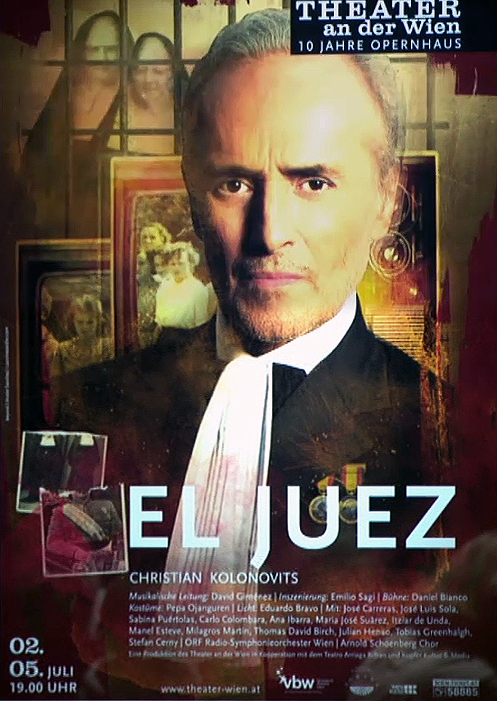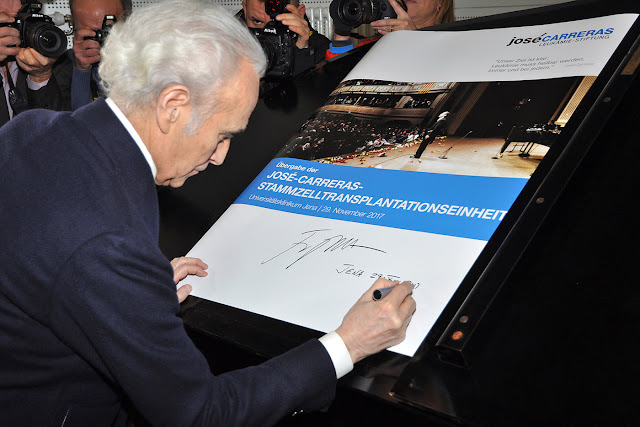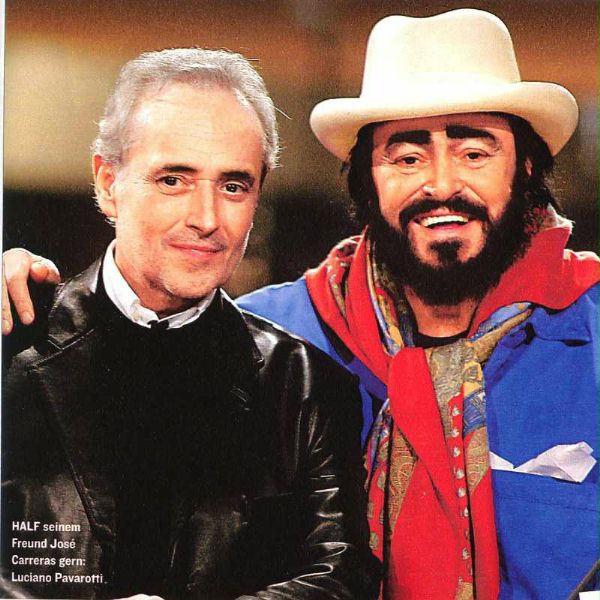"EL JUEZ": OUTSTANDING PREMIERE AT THE THEATER AN DER WIEN
Trionfo sembra la scelta lessicale più indicata per descrivere l'esito della premiere de El Juez presso il Theater an der Wien al fine di celebrare i primi 10 anni di questo giovane teatro d'opera viennese.
Dopo oltre 10 anni, Josep Carreras ha effettuato così il suo ritorno a Vienna con un'opera, conquistando nuovamente il pubblico locale che, ancora una volta, si è rivelato unico nell'esprimere l'apprezzamento e la gratitudine nei confronti di uno degli artisti lirici che più ha amato in assoluto: quasi venti minuti di applausi ininterrotti hanno costretto i tecnici del teatro ad alzare il sipario a più riprese, permettendo a tutto il cast di ricevere l'omaggio della sala gremita in entrambe le recite, sold-out da ormai diversi mesi.
Dopo oltre 10 anni, Josep Carreras ha effettuato così il suo ritorno a Vienna con un'opera, conquistando nuovamente il pubblico locale che, ancora una volta, si è rivelato unico nell'esprimere l'apprezzamento e la gratitudine nei confronti di uno degli artisti lirici che più ha amato in assoluto: quasi venti minuti di applausi ininterrotti hanno costretto i tecnici del teatro ad alzare il sipario a più riprese, permettendo a tutto il cast di ricevere l'omaggio della sala gremita in entrambe le recite, sold-out da ormai diversi mesi.
Musica: Christian Kolonovits
Libretto: Angelika Messner
Direttore musicale: David Giménez
Regia: Emilio Sagi
Scenografie: Daniel Bianco
Costumi: Pepa Ojanguren
Luci: Eduardo Bravo
PHOTOS
https://www.theater-wien.at/
https://www.leadersnet.at/
VIDEOS
http://tvthek.orf.at/
RELATED POST:
josepcarreras-tenor.blogspot.com
Dopo la prima mondiale a Bilbao nel 2014 e le successive recite a Erl nello stesso anno e San Pietroburgo nel 2015, Josep Carreras propone il tema drammatico dei bambini scomparsi, strappati alle famiglie dissidenti e rieducati secondo i principi propri del regime franchista in Spagna, in una delle città cui la sua gloriosa carriera è maggiormente vincolata attraverso l'opera dell'austriaco Christian Kolonovits su libretto di Angelika Messner. Le due recite si sono svolte rispettivamente in 2 e il 5 luglio.
 |
© Herwig Prammer
|
Senza voler fare politica, Kolonovits ha scelto di ispirarsi a un panorama storico che la famiglia del tenore ha vissuto da vicino e lo ha trasformato in un'opera totalmente tonale, con echi della migliore tradizione classica ma anche richiami ai ritmi spagnoli e addirittura al musical. Di forte impatto, l'allestimento realizzato da Emilio Sagi e Daniel Bianco è lo stesso delle recite precedenti, e profondamente indicato per rappresentare uno dei capitoli più oscuri della storia spagnola.
Attraverso i sottotitoli in tedesco il pubblico locale ha potuto comprendere e apprezzare pienamente il lavoro, nonché le grandi prestazioni di tutti i membri del cast.
A pochi mesi dai suoi settant'anni Josep Carreras si è riaffermato in scena da grande maestro dell'interpretazione, mostrando anche una ottima condizione vocale e fisica. Ancora una volta ha saputo tratteggiare prodigiosamente il dramma interiore che caratterizza il suo personaggio, il giudice Federico Ribas, creato su misura al fine di valorizzare tutti i suoi grandi punti di forza, ormai più unici che rari: si è rivelato sicuro e travolgente nei picchi più drammatici e squisito nei passaggi più lirici, rispettivamente incarnati dalle due arie principali, Sistema cruel e Tras los ojos llora el alma, entrambe premiate con lunghe e calorose ovazioni. Tuttavia, non sarebbe adeguato circoscrivere tanta bravura unicamente a questi due momenti, poiché ha saputo relazionarsi magnificamente in scena anche con i colleghi, dando ulteriore spessore a determinati momenti dell'opera sia a livello scenico sia vocale.
Sia le critiche, sia il pubblico hanno espresso meritato apprezzamento nei confronti del resto del cast: calorosamente applauditi il tenore José Luis Sola e il soprano Sabina Puértolas, nei panni del cantautore Alberto García e la giornalista Paula, che ci hanno accompagnato nel corso dell'opera attraverso alcuni dei motivi più emozionanti: entrambi dotati di bel timbro e agilità nel registro acuto hanno interpretato i loro ruoli in maniera corretta e con grande personalità.
 |
© Herwig Prammer
|
Imponente la presenza scenica e la potenza vocale di Carlo Colombara che con il suo timbro scuro e intelligenza interpretativa ha dato una lettura molto credibile di Morales, malvagio portavoce dell'ala più estrema del franchismo. Ottima anche la dizione.
Di grande intensità è stata anche Ana Ibarra che con estrema espressività ha dato vita alla disperazione della badessa, dilaniata nell'anima da un forte contrasto di sentimenti: la fedeltà a Dio, il forte istinto materno e la graduale maturazione di senso di colpa.
Prestazioni di livello sono state anche quelle del mezzosoprano María José Suárez, nel doppio ruolo di suora e María, Itziar De Unda con la gioiosa coloratura volta a rappresentare la spensieratezza di una monaca, Milagros Martín con la sua pregnante invettiva e Manel Esteve, baritono nel ruolo del cameraman, insieme ai quattro uomini di Morales: Julian Henao González, Thomas David Birch, Ben Connor e Stefan Cerny. La figlia del giudice è stata interpretata da Lana Matic.
Degna di elogi anche la performance del'Arnold Schoenberg Chor e dei suoi solisti, insieme a quella della ORF-Radio Symphonieorchester Wien diretta correttamente da David Giménez.
Complessivamente, un grandissimo successo cui hanno contribuito tutti. Congratulazioni a tutto il cast, in modo speciale a Josep Carreras per aver dimostrato ancora una volta tanta maestria in scena e una sensibilità interpretativa fuori serie.

ENGLISH:
Triumph seems the most appropriate word choice to describe the premiere of El Juez at the Theater an der Wien in order to celebrate the first 10 years of this young Viennese opera house. After more than 10 years, Josep Carreras sang opera back again to Vienna, seducing the local public that, once again, proved to be unique at expressing appreciation and gratitude to one of the opera stars they have loved most: almost twenty minutes of uninterrupted ovations forced to raise the curtain on several occasions, allowing the cast to receive the homage of the whole, crowded hall in both performances, each of which was sold-out since a few months.
After the world premiere in Bilbao in 2014 and additional performances in Erl and St. Petersburg, Josep Carreras offered the dramatic theme of missing children in Spain, torn from their dissident families and re-educated according to the Franco regime principle, in one of the cities his glorious career has been more attached to through the work of the Austrian composer Christian Kolonovits , with libretto by Angelika Messner. The two performances were held respectively on 2 and 5 July.
With no intention to do any politics, Kolonovits chose to be inspired by a historical scenario which the tenor's family had closely experienced and turned it into a completely tonal music, with echoes of the best operatic tradition but also with references to Spanish rhythms and even to musicals. Strongly impacting, the scene by Emilio Sagi and Daniel Bianco is the same as previous performances, and deeply apt to represent one of the darkest chapters of Spanish history.
Through the subtitles in German the public has been able to fully understand and appreciate the work and the great performance of all the cast members.
A few months before turning 70, Josep Carreras proved to be an amazing master of interpretation, showing also a great vocal and physical condition. Once again, he prodigiously sketched out the inner drama of his character, Judge Federico Ribas, a custom-made role in order to exploit all his strong point, which currently seem one of a kind: overwhelming in the most dramatic peaks and exquisite in the most lyrical passages, respectively embodied by his two major arias, Sistema cruel and Tras los ojos llora el alma, both rewarded with long and warm applause.
However, it would not be appropriate to circumscribe so much talent only in these two very moments, since he was able to perfectly relate with his colleagues on-stage, conveying further prestige at both vocal and scenic level.
Reviews as well as the public expressed well-deserved appreciation towards the rest of the cast: José tenor Luis Sola and soprano Sabina Puértolas, respectively portraying songwriter Alberto García songwriter and journalist Paula, were warmly ovationed as they were responsible for some of the most emotional motifs: both with beautiful timbre and agility in the high register, they played their roles correctly and with great personality.
Carlo Colombara showed a remarkable stage presence and vocal power: he plausibly played evil Morales, vice-president of the extreme right wing, with his dark timbre as well as good diction.
Ana Ibarra gave life with great intensity to the abbess' despair: she perfectly expressed her soul torn apart by a violent contrast of feelings: loyalty to God, strong maternal instinct and gradual awareness of guilt.
The rest of the cast did a great job as well: charismatic mezzosoprano María José Suárez, in the double role of a nun and María, soprano Itziar de Unda with her joyful coloratura to represent the light-heartedness of the other nun, dramatic soprano Milagros Martín with her pregnant invective, baritone Manel Esteve, brilliant in the role of the cameraman, and the four men of Morales: Julian Henao González, Thomas David Birch, Ben Connor and Stefan Cerny. The judge's daughter was played by Lana Matic.
Worthy of note was also the performance of the Arnold Schoenberg Choir and its soloists, along with that of the ORF Radio-Symphonieorchester Wien live properly by David Giménez.
Overall, a huge success which everyone contributed. Congratulations to all the cast, especially to Josep Carreras for having once again demonstrated such mastery and remarkable interpretive sensitivity once again.
Degna di elogi anche la performance del'Arnold Schoenberg Chor e dei suoi solisti, insieme a quella della ORF-Radio Symphonieorchester Wien diretta correttamente da David Giménez.
Complessivamente, un grandissimo successo cui hanno contribuito tutti. Congratulazioni a tutto il cast, in modo speciale a Josep Carreras per aver dimostrato ancora una volta tanta maestria in scena e una sensibilità interpretativa fuori serie.
BRAVO JOSEP!!
BRAVI TUTTI!!

 |
| (c) Karl Schöndorfer |
ENGLISH:
Triumph seems the most appropriate word choice to describe the premiere of El Juez at the Theater an der Wien in order to celebrate the first 10 years of this young Viennese opera house. After more than 10 years, Josep Carreras sang opera back again to Vienna, seducing the local public that, once again, proved to be unique at expressing appreciation and gratitude to one of the opera stars they have loved most: almost twenty minutes of uninterrupted ovations forced to raise the curtain on several occasions, allowing the cast to receive the homage of the whole, crowded hall in both performances, each of which was sold-out since a few months.
After the world premiere in Bilbao in 2014 and additional performances in Erl and St. Petersburg, Josep Carreras offered the dramatic theme of missing children in Spain, torn from their dissident families and re-educated according to the Franco regime principle, in one of the cities his glorious career has been more attached to through the work of the Austrian composer Christian Kolonovits , with libretto by Angelika Messner. The two performances were held respectively on 2 and 5 July.
With no intention to do any politics, Kolonovits chose to be inspired by a historical scenario which the tenor's family had closely experienced and turned it into a completely tonal music, with echoes of the best operatic tradition but also with references to Spanish rhythms and even to musicals. Strongly impacting, the scene by Emilio Sagi and Daniel Bianco is the same as previous performances, and deeply apt to represent one of the darkest chapters of Spanish history.
Through the subtitles in German the public has been able to fully understand and appreciate the work and the great performance of all the cast members.
A few months before turning 70, Josep Carreras proved to be an amazing master of interpretation, showing also a great vocal and physical condition. Once again, he prodigiously sketched out the inner drama of his character, Judge Federico Ribas, a custom-made role in order to exploit all his strong point, which currently seem one of a kind: overwhelming in the most dramatic peaks and exquisite in the most lyrical passages, respectively embodied by his two major arias, Sistema cruel and Tras los ojos llora el alma, both rewarded with long and warm applause.
However, it would not be appropriate to circumscribe so much talent only in these two very moments, since he was able to perfectly relate with his colleagues on-stage, conveying further prestige at both vocal and scenic level.
Reviews as well as the public expressed well-deserved appreciation towards the rest of the cast: José tenor Luis Sola and soprano Sabina Puértolas, respectively portraying songwriter Alberto García songwriter and journalist Paula, were warmly ovationed as they were responsible for some of the most emotional motifs: both with beautiful timbre and agility in the high register, they played their roles correctly and with great personality.
Carlo Colombara showed a remarkable stage presence and vocal power: he plausibly played evil Morales, vice-president of the extreme right wing, with his dark timbre as well as good diction.
Ana Ibarra gave life with great intensity to the abbess' despair: she perfectly expressed her soul torn apart by a violent contrast of feelings: loyalty to God, strong maternal instinct and gradual awareness of guilt.
The rest of the cast did a great job as well: charismatic mezzosoprano María José Suárez, in the double role of a nun and María, soprano Itziar de Unda with her joyful coloratura to represent the light-heartedness of the other nun, dramatic soprano Milagros Martín with her pregnant invective, baritone Manel Esteve, brilliant in the role of the cameraman, and the four men of Morales: Julian Henao González, Thomas David Birch, Ben Connor and Stefan Cerny. The judge's daughter was played by Lana Matic.
Worthy of note was also the performance of the Arnold Schoenberg Choir and its soloists, along with that of the ORF Radio-Symphonieorchester Wien live properly by David Giménez.
Overall, a huge success which everyone contributed. Congratulations to all the cast, especially to Josep Carreras for having once again demonstrated such mastery and remarkable interpretive sensitivity once again.






PERFECTO COMO TODO LO QUE EMPRENDE JOSEP CARRERAS
ReplyDelete